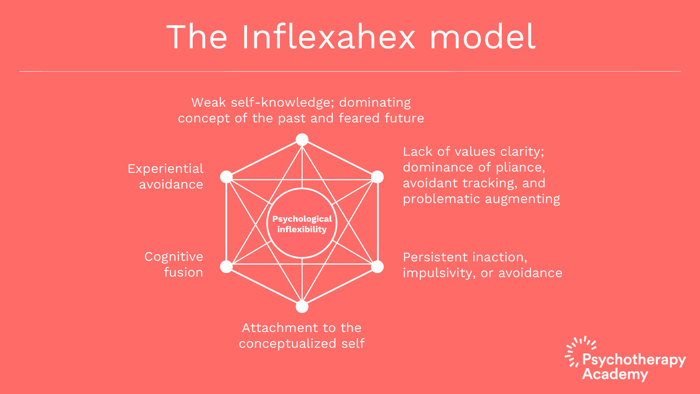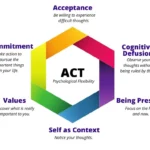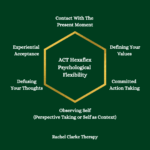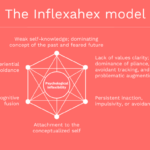The ACT Hexaflex model is an essential tool in Acceptance and Commitment Therapy (ACT), designed to improve mental flexibility and overall psychological well-being.
This model consists of six core techniques that assist individuals in addressing challenging thoughts and emotions while staying focused on their personal values. This article will explore the ACT Hexaflex model, its six components, and how it’s implemented in therapy to foster psychological resilience and flexibility.
What is Psychological Flexibility?
Psychological flexibility is the ability to adapt to difficult situations, thoughts, and emotions without being overwhelmed by them. It’s about staying open to all experiences, both positive and negative, while making conscious decisions based on your personal values.
This flexibility helps individuals handle life’s challenges more efficiently, improving mental health and promoting a balanced life. It offers a practical framework for managing thoughts and emotions, as well as aligning behaviors with values.
ACT Hexaflex Model
The ACT Hexaflex model is composed of six core techniques, each contributing to the development of mental flexibility. These techniques are interconnected, working together to help individuals manage challenging thoughts and emotions.
Cognitive Defusion
Cognitive defusion involves stepping back from your thoughts and seeing them as just thoughts, rather than absolute truths. Often, we get caught up in negative or unhelpful thinking, which impacts how we experience and act in the world.
Cognitive defusion encourages you to observe these thoughts without letting them control your actions. For example, instead of thinking, “I’m a failure,” cognitive defusion allows you to reframe it as “I have the thought that I feel like a failure.” This small shift can reduce the emotional impact of negative thinking.
Acceptance
Acceptance involves allowing yourself to experience uncomfortable thoughts and emotions without trying to avoid or fight them. It’s about embracing reality, even when it’s unpleasant.
For instance, if you’re feeling frustrated, instead of pushing the tension away or pretending it doesn’t exist, acceptance allows you to acknowledge the feeling and move forward.
This approach is essential in the ACT Hexaflex model as it enables you to truly experience life’s ups and downs without getting stuck in them.
Contact with the Present Moment (Mindfulness)
Mindfulness in the ACT Hexaflex model refers to being fully present and aware of your current experience. It’s about focusing on the present moment instead of dwelling on the past or worrying about the future.
Mindfulness and ACT Hexaflex go hand in hand, as mindfulness enhances mental flexibility by helping you stay grounded.
When you practice mindfulness, you learn to observe your thoughts and emotions without judgment, which makes it easier to respond to situations calmly and effectively.
Self-as-Context
Self-as-context is the concept where you are not defined by your thoughts and emotions; rather, you are the observer of them.
This technique helps create a sense of detachment from the internal dialogue that often dictates how we experience life. This shift allows you to respond to challenges with greater resilience and much less emotional turmoil.
Values
Values are deeply held beliefs about what is important to you. They guide your actions and decisions, helping you lead a life that feels meaningful and authentic. In the ACT Hexaflex model, connecting with your values is crucial for creating a fulfilling life.
When you understand what truly matters to you, it becomes easier to make decisions that align with your values, even when faced with difficult emotions or situations. Values and ACT Hexaflex work together to provide direction and motivation in life.
Committed Action
Committed action refers to taking concrete steps toward your goals, guided by your values, despite any challenging situations you may encounter.
This technique is about making long-term, value-driven choices and staying on course, even when things get tough. Committed action requires patience and mental resilience.
It’s not just about making decisions but continually aligning with your values over time.
ACT Hexaflex Model in Therapy
Acceptance and Commitment Therapy (ACT) uses the ACT Hexaflex model to help clients build psychological flexibility. In therapy, each of the six techniques is explored and applied to the individual’s specific challenges.
By working through the ACT Hexaflex in therapy, clients learn how to manage distressing thoughts and emotions while living in alignment with their values.
One of the main goals of ACT is to help people move away from rigid, unhelpful thinking patterns and adopt a more flexible, adaptive mindset.
Cognitive defusion is a key technique used to help clients understand and detach from negative thought patterns. Mindfulness practices are also central to ACT, as they help clients stay grounded and present in the face of emotional distress.
By focusing on values, therapists guide clients toward actions that are meaningful and beneficial. This approach allows individuals to live in a way that is true to their personal beliefs, regardless of the emotionally difficult situations they face.
ACT Hexaflex Model for Mental Well-Being
The ACT Hexaflex model is a powerful framework for promoting mental well-being. By encouraging individuals to accept their thoughts and emotions, stay mindful, and live true to their values, the model fosters a sense of stability and fulfillment.
Each component of the ACT Hexaflex model works to reduce emotional suffering and promote healthier ways of thinking and behaving.
One of the key benefits of mental flexibility is its role in enhancing mental health.
Research has shown that individuals who are more psychologically flexible are better able to handle stress, anxiety, and depression.
The ACT Hexaflex model for mental well-being provides a means to increase this flexibility, making it easier to navigate life’s inevitable stressful situations.
Psychological Resilience Techniques
The ACT Hexaflex model also offers powerful psychological resilience techniques. These methods help individuals recover from adversity and manage difficult emotions.
For instance, acceptance teaches people to embrace discomfort instead of avoiding it, which builds emotional strength.
Mindfulness helps individuals stay focused on the present and manage stress, while values provide a sense of purpose and motivation in tough times.
By practicing these resilience techniques, individuals can strengthen their ability to face stressful situations without becoming overwhelmed.
The ACT Hexaflex model encourages a mindset that is both flexible and resilient, promoting long-term mental health and emotional stability.
Conclusion
The ACT Hexaflex model is a powerful tool for developing mental flexibility and improving psychological well-being. Its six core techniques—cognitive defusion, acceptance, mindfulness, self-as-context, values, and committed action—work together to help individuals manage challenging thoughts and emotions while staying true to their values.
Whether used in therapy or everyday life, the ACT Hexaflex model provides practical strategies for building resilience, reducing emotional distress, and living a more meaningful, authentic life. By embracing this model, individuals can unlock greater mental flexibility and navigate life’s challenges with ease.
FAQs
What is the Hexaflex model?
The ACT Hexaflex model is a framework in Acceptance and Commitment Therapy (ACT) that focuses on six core techniques—cognitive defusion, acceptance, mindfulness, self-as-context, values, and committed action—to promote psychological flexibility and resilience.
How does cognitive defusion help in managing negative thoughts?
Cognitive defusion involves stepping back from negative thoughts and viewing them as just thoughts instead of absolute truths. This reduces their emotional impact and prevents them from controlling behavior.
Why is acceptance essential in psychological flexibility?
Acceptance involves allowing yourself to experience uncomfortable thoughts and emotions without avoiding or resisting them. This process helps individuals move forward despite challenges, fostering emotional resilience.
How can mindfulness enhance mental well-being?
Mindfulness encourages staying present and aware of the current moment without judgment. It helps individuals focus on the here and now, reducing stress and enhancing emotional regulation.
What role do values play in the Hexaflex model?
Values provide a sense of purpose and direction, guiding individuals toward meaningful actions. They help align behavior with personal beliefs, ensuring a fulfilling and authentic life.
Can the Hexaflex model be used outside therapy?
Yes, the ACT Hexaflex model provides practical techniques for managing emotions, staying true to values, and fostering resilience, making it relevant in everyday life for personal growth and well-being.












